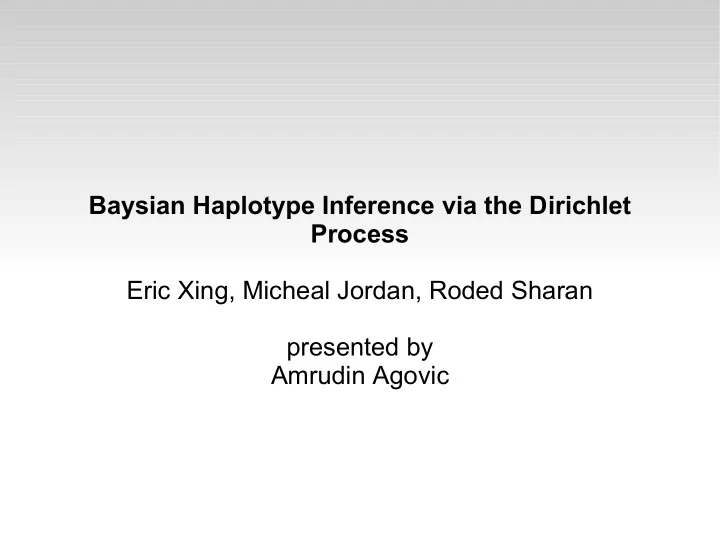

Baysian Haplotype Inference via the Dirichlet Process Eric Xing, Micheal Jordan, Roded Sharan presented by Amrudin Agovic
Motivation 99.9 % of human DNA shared 0.1% of DNA makes up for differences Need to determine what those 0.1% are Find genes responsible for diseases
Background Humans have 23 pairs of chromosomes in their cells 23 come from the father, 23 from the mother Certain parts of the genome are inherited unchanged Other genetic information gets mixed up
Background Allele: genetic coding that occupies a position on the chromosome. Genotype: unordered pairs of Alleles in a region (one from each chromosome) Phase: Allele Chromosome association (not given) SNP: Single Nucleotide Polymorphism, difference in one nucleotide (A,C,G,T) Haplotype: set of associated SNP alleles in a region of a chromosome. A haplotype is inherited as a unit.
Background
Dirichlet Process Representation Let G 0 ( Ф ) be a base measure for the dirichlet process A (k) :=[A 1 (k) ,..,A J (k) ] be a founding haplotype configuration (ancestral template) at loci t=[1,..,J] θ (k) be the mutation rate of the ancestor Ф be the parameter associated with a mixture component. Where Ф k = {A (k) , θ (k) }
Dirichlet Process Representation Use Chinese Restaurant Process Associate population haplotype with table Sample for each table Ф k = {A (k) , θ (k) }
The Model
Assumptions G 0 ( A,θ )=p( A)p(θ) p(A) uniform distribution over all haplotypes p(θ) is Beta( α h , β h )
Distributions Considering for all alleles mutations: Integrating out theta:
Noisy Observation Model Observed Genotype at a locus determined by parental and maternal alleles If genotype disagrees penalize γ has Beta prior
Pedigree-Haplotyper
Inference - Gibbs Sampling γ and θ integrated out Sample C it , A j (k) , H it,j (k) 1) Given current hidden values of haplotypes sample c it , a j
Gibbs Sampling 2) Given ancestral assignment and ancestral pool sample haplotype
Metropolis Hastings Long list of loci and uniform prior p(a), leaves probability of sampling new ancestor very small. Slow mixing Sample ancestor assignment using proposal distribution
Metropolis Hastings In acceptance probability, the proposal factor cancels out
Experiments Simulated Data: Haplotypes randomly paired to form genotypes. Performance compared to PHASE
Experiments Two real data sets: 129 individuals, 90 individuals from 4 populations Dataset 1:
Experiments Dataset 2: Small sample size, tougher data set Haplotyper outperforms PHASE
Conclusions Algorithm outperform PHASE on two data sets With a big margin on one of them. Strength of proposed approach in flexibility Can be extended to incorporate aspects of evolutionary dynamics and other things Illustrated example: Pedigree information
Recommend
More recommend